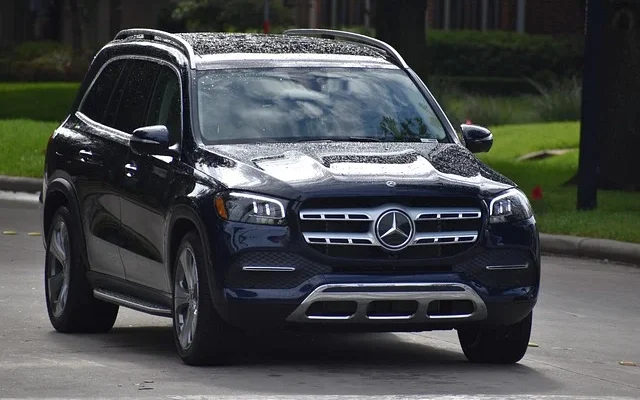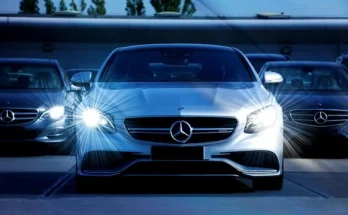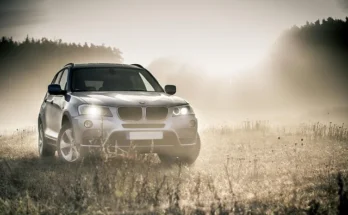Introduction:
Have you ever considered why purchasing a luxury car can be so challenging? The thing is, it doesn’t have to be. Best luxury small suv have figured out what modern drivers really want: high-end comfort without the trouble of driving huge cars.
After testing almost all of the luxury small SUVs on the market, I’ve found something interesting. These aren’t just smaller versions of bigger SUVs; they’re machines made for people who want style without giving up anything.
Let me tell you what I’ve learned about how to find the best luxury small SUV for your needs.
Finding the Sweet Spot for Best Luxury Small SUV
The little things are what make the magic happen. These cars fit into a very specific category that doesn’t quite fit with traditional ones.
A Size Philosophy That Works
Imagine Goldilocks, but with cars. Most real-world situations are fine with luxury small SUVs that are between 175 and 185 inches long. They’re big enough to feel safe on highways but small enough that parking in the city doesn’t become a strategic mission.
What you get with this size:
- Confidently driving on the highway without being scared of city streets
- Parking that doesn’t need an engineering degree
- Space for real-life stuff like groceries, luggage, and weekend gear
- A seating position that lets you see without needing a ladder
- Fuel economy that won’t surprise you at the pump
High-Quality Work Where It Matters
Real luxury is defined not just by how things look, but also by how they work. The quality of the execution is what makes something good or outstanding.
What makes something truly luxurious:
- Materials that don’t show wear quickly but instead get better with age
- Controls that are easy to find where your hands naturally go
- Soundproofing that makes the cabin a peaceful place to be
- Climate systems that keep you comfortable without you having to change them all the time
- Integration of technology that makes things easier instead of harder
Balance in engineering that makes sense
Modern luxury small SUVs solve the old problem of having to choose between power and efficiency. With advanced engineering, these cars can be as versatile as SUVs but as refined as sedans.
The secret sauce includes smart all-wheel drive, advanced suspension systems, and powertrains that are tuned for both efficiency and quickness. It’s engineering that cares more about how things work in the real world than about bragging rights.
The Best Performers of the Day
Let me show you the cars that are currently setting the standard in this category. Each one has its own strengths that appeal to different types of buyers.
Genesis GV70: The Overachiever That Surprises Everyone
Genesis has quietly built something remarkable with the GV70. This car always goes above and beyond what you expect in ways that matter for everyday use.
GV70 Excellence Breakdown:
| Category | GV70 Advantage | Real-World Effect |
| Design Language | Athletic yet classy style | Stands out without being too loud |
| Interior Quality | Premium materials used throughout the cabin | From day one, it feels like it costs a lot |
| Performance Range | Standard: 300hp, available: 375hp | Good enough to thrilling, depending on your choice |
| Technology Suite | Complete but not hard to use | Everything works the way you’d expect it to |
| Value Proposition | High-end features at low prices | More luxury for the same amount of money than competitors |
The GV70 is just as adept at handling morning commutes and weekend road trips. The base engine has enough power for most situations, but the twin-turbo V6 really gets you going when you want it to.
From the owner’s perspective, Genesis backs the GV70 with an excellent warranty, making it a smart long-term choice for buyers who want to feel safe.
The BMW X3: The Balanced Athlete
BMW’s X3 is the result of decades of work to improve this type of car. It has changed into a car that meets both practical needs and the joy of driving.
A summary of X3’s strengths:
Flexibility of the powertrain: three different engine choices, from efficient to thrilling
- Interior Space: Packaging that makes the most of the available space
- Integration of technology: The iDrive system that really works
- Brand Heritage: A history of high quality and performance
- Service Network: A large number of dealers are available for maintenance and support.
Performance Character: The X3 keeps BMW’s driving DNA while adding the usefulness of an SUV. The steering feels connected, the handling stays calm, and the whole thing makes car lovers happy without making people who want comfort feel left out.
Long-term value: The X3 is a smart financial choice for people who plan to own it for a long time because it has high resale values and full dealer support.
The Audi: A Leader in Technology
Audi looks at luxury small SUVs from the point of view of cutting-edge technology and well-designed interiors. The shows that digital technology can make driving better instead of harder.
Technology Leadership:
| Innovation | Function | Benefit |
| Virtual Cockpit | Plus lets you change the look of your digital displays | Get the information you need right away |
| Touch Response from MMI | Controls that give you haptic feedback | Interaction like a smartphone |
| Quattro Ultra | All-wheel drive | When possible, be efficient; when necessary, be capable. |
| Audi Connect | Services for connecting everything together | Integration of a digital lifestyle without any problems |
- Interior excellence: The Q5’s cabin shows that Audi knows how to use high-quality materials and design things well. Everything feels strong, elegant, and made to last.
- Driving dynamics: Puts smooth, refined performance ahead of outright sportiness. The Q5 makes every trip feel more civilized.
The Lexus NX is the most reliable car.
If long-term reliability is your top priority, the Lexus NX has some great features based on Toyota’s engineering skills.
NX Reliability Foundation:
| Reliability Factor | NX Advantage | Long-Term Value |
| Quality of Build | Very high standards for making things | Less trouble during the ownership period |
| Durability of the powertrain | Hybrid and gasoline engines that work | Less need for maintenance |
| Lifespan of components | Conservative way to do engineering | Longer life cycles for components |
| Help with Service | A wide network of dealers | Easy to take care of no matter where you go |
Hybrid efficiency: The NX Hybrid gets excellent gas mileage without losing any of its SUV capabilities. It’s effective without feeling like a compromise.
Ownership peace of mind: Lexus owners are always happy with their cars because they are very reliable and easy to own.
Strategic Comparison: Finding Your Match
| Model | Starting Investment | Greatest Strength | Perfect For |
| Genesis GV70 | $44,500 | Great value delivery | People who want luxury without paying a lot for it |
| BMW X3 | $47,900 | Balance of driving dynamics | People who love things but need them to be useful |
| Audi Q5 | $46,800 | Leading in technology | Digital natives who like things to be perfect |
| Mercedes GLC | $48,650 | Optimizing comfort | Buyers putting ride quality above all else |
| Lexus NX | $39,420 | History of dependability | Buyers who want luxury but also want reliability |
Finding the Right Cars for Real Life
To own a luxury small SUV successfully, you need to be honest with yourself about what you really need and what you think you want.
The Point of View of the Urban Professional
What you do every day:
- Finding your way through busy city streets and tight parking
- Putting on a professional face when dealing with clients
- Getting the most out of your gas for your daily commute
- Using technology to boost productivity on the go
Best options:
- Lexus NX Hybrid: Great fuel economy and a reputation for luxury
- Audi Q3: Small size, high-end technology
Most important features:
- Advanced systems for helping with parking
- Smartphones connect without any problems
- Powertrains that work well for cheap commutes
- High-quality materials for a professional look inside
What the Weekend Explorer Needs
How you drive:
- Driving conditions that are both urban and rural
- Weather changes from season to season that require ability
- Cargo space for recreational equipment
- Confidence in all weather for adventure spots
Best choices:
- Genesis GV70: Full range of features with strong warranty support
- BMW X3 xDrive: All-wheel drive that works and handles well
Important skills:
- Strong all-wheel drive systems that work in a variety of situations
- Enough ground clearance for getting to unpaved areas
- Cargo configurations that can change for moving gear
- Strong construction for use in a variety of conditions
The Technology Lover’s Priorities
What you expect:
- New infotainment and connectivity
- Advanced driver assistance for more safety
- Regular software updates to keep it useful
- Combining with digital lifestyle choices
Best suggestions:
Audi Q5: The best virtual cockpit and connectivity in the business
Genesis GV70: A full set of tech features at a reasonable price
Must-have new features:
- Touchscreens that are big and responsive
- Charging and connecting wireless devices
- Advanced driver help with regular updates
- High-end audio systems for fun
The luxury seeker who cares about value
Your way of doing things:
- The most luxurious features for every dollar spent
- Strong warranty protection for your peace of mind
- Great potential to keep its value over time
- Costs of ownership and maintenance that are fair
Smart choices:
- Genesis GV70: Great features for the money
- Lexus NX: High resale values and low costs for upkeep
Smart ways to buy:
- Think about buying a certified pre-owned car from a high-end brand.
- Pay attention to full warranty coverage
- Look into how reliable and well-maintained things have been in the past.
- Consider evaluating the total cost of ownership, rather than focusing solely on the item’s price.
Complete Ownership Cost Analysis
Understanding the full financial picture prevents surprises and enables better decision-making.
Investment Range Breakdown
| Price Level | Feature Level | Sample Models |
| $39,000-$45,000 | Important luxury features | Genesis GV70 2.5T and Lexus NX base |
| $45,000 to $55,000 | All-inclusive high-end gear | Audi Q5, BMW X3, and Mercedes GLC |
| $55,000–$70,000 | Performance variants with extra features | BMW X3 M40i and Genesis GV70 3.5T |
Costs of Ownership Each Year
Insurance costs between $1,100 and $1,900 a year.
- Luxury cars need higher coverage limits.
- You might be able to get a discount if your car has advanced safety features.
- Your residence significantly influences your rates.
- Your driving record affects how much your premiums will be.
Budget for gas: $1,000 to $2,200 a year
- Hybrid models have a lot of potential to save money.
- Different performance levels use more gas to get more power
- Each person’s driving style greatly influences actual costs.
- The cost of fuel right now affects how much you spend each year.
Budget for maintenance expenses ranging from $500 to $1,400 annually.
- Usually, German luxury brands need more money for upkeep.
- In general, Japanese luxury brands have lower maintenance expenses.
- Genesis offers free maintenance for the first year of ownership.
- Preventive maintenance lowers the cost of repairs over time.
Reality of Depreciation: 12–20% in the first year and 8–12% in the years after that
- Lexus and BMW are better at keeping their value over time.
- Genesis is making a name for itself in the used car market.
- Rates of depreciation are affected by how popular a model is and how the market is doing.
- The condition of the vehicle and how well it has been cared for affect its resale value.
Smart Ways to Shop
Buying a luxury small SUV successfully requires strategic thinking and smart choices.
Best Timing Strategies
Best times for opportunities:
- Changes in model years (August through October) for inventory that is going out
- Manufacturer incentive periods for months when sales are slow
- When dealers focus on volume goals at the end of the quarter
- Holiday weekends with special deals and discounts
Things to think about for the new model:
- There may still be quality problems with the first model years.
- Mid-cycle refreshes often offer the best balance between features and reliability.
- If the features meet your needs, outgoing models can save you a lot of money.
- Analysis of Financing vs. Leasing
Benefits of leasing:
- Pay less each month to get access to luxury features
- Ability to use the newest technology without making a long-term commitment
- Costs that are easy to predict and a warranty that lasts the whole lease term
- The ability to switch cars as needs change
Benefits of buying:
- Building equity instead of making payments all the time
- No limits on how far you can drive for long trips
- Freedom to change things to fit your personal preferences
- Possible long-term savings on costs for long-term ownership
Value Proposition for Certified Pre-Owned
Benefits of the CPO program:
- Usually, you can save 20–30% compared to the price of a new car.
- Remaining factory warranty coverage for ongoing protection
- Extra certified warranty extensions for more peace of mind
- Thorough multi-point inspections to make sure quality standards are met
Great CPO programs:
- BMW: Full coverage with a large network of dealer support
- Lexus: The reputation for reliability is boosted by warranty protection.
- Genesis: Good warranty terms even though they are new to the market
- Mercedes: High-quality service with thorough inspections
Future-Focused Buying Decisions
Smart buyers consider how automotive trends might affect their vehicle choice over time.
Electrification Evolution
Current hybrid availability:
- Lexus NX Hybrid: Proven efficiency with Toyota reliability
- BMW X3 xDrive30e: Plug-in hybrid for electric-only commuting
- Mercedes GLC 300e: Premium plug-in hybrid option with luxury focus
Emerging electric alternatives:
- Genesis Electrified GV70: Premium electric performance available now
- BMW iX3: Electric interpretation of proven X3 platform
- Audi Q4 e-tron: Compact electric SUV with Q5-like positioning
Strategic considerations: Evaluate your typical driving patterns, charging infrastructure access, and planned ownership duration. Current hybrid technology often provides optimal balance of efficiency and convenience for most buyers.
Technology Advancement Patterns
Standard feature evolution:
- Driver assistance systems becoming universal rather than optional
- Wireless connectivity replacing physical connections
- Voice control improving through artificial intelligence advancement
- Over-the-air updates extending vehicle capability lifecycles
Planning for obsolescence: Choose vehicles with robust software architectures supporting future updates. Brands with strong technology development capabilities typically maintain relevance longer.
Warning Signs to Recognize
Experience teaches valuable lessons about avoiding problematic purchases.
Dealer Practice Red Flags
Concerning behaviors:
- Refusing to provide transparent pricing documentation
- Adding undisclosed fees or charges after initial discussions
- Pressuring immediate decisions without consideration time
- Limiting access to vehicle inspection or independent evaluation
- Consistent negative reviews mentioning deceptive practices
Vehicle Condition Concerns
Quality indicators to verify:
- Complete maintenance records demonstrating proper care
- No significant accident history affecting structural integrity
- Recall compliance and technical service bulletin completion
- Manufacturer warranty status and transferability
- Parts availability for discontinued or rare models
Your Decision Framework
Making the final choice requires systematic evaluation and honest self-reflection.
Comprehensive Test Drive Protocol
Urban evaluation:
- Parking ease in typical spaces you’ll encounter
- Visibility and blind spot management during city driving
- Control accessibility and intuitive operation while driving
- Ride quality over various road surface conditions
Highway assessment:
- Stability and confidence at typical cruising speeds
- Noise levels affecting passenger comfort
- Driver assistance system effectiveness in real conditions
- Acceleration capability for safe merging and passing
Practical verification:
- Seating comfort for your typical trip durations
- Cargo space adequacy for your regular hauling needs
- Technology system usability without instruction manual reference
- Climate control effectiveness throughout cabin areas
Final Confirmation Questions
Before committing to any purchase, ensure you can confidently answer:
- Does this vehicle genuinely match my daily driving patterns and needs?
- Can I comfortably manage all ownership costs without financial stress?
- Will this choice still satisfy me in three to five years?
- Have I thoroughly considered all viable alternatives?
- Do I completely understand all purchase or lease terms and conditions?
Success Indicators
You’ve chosen correctly when:
- Monthly payments fit comfortably within your established budget
- Vehicle capabilities match your practical requirements without excess
- Daily driving brings genuine satisfaction rather than compromise
- Brand reputation provides confidence in long-term reliability
- Total ownership costs align with your financial planning
Your Journey to Luxury Small SUV Ownership
The luxury small SUV segment offers exceptional choices that would have seemed impossible just a few years ago. Whether you choose the value-focused Genesis GV70, the driving-oriented BMW X3, the technology-rich Audi Q5, the comfort-prioritized Mercedes GLC, or the reliability-champion Lexus NX, you’re selecting a vehicle representing the pinnacle of automotive engineering in this category.
Success in this market requires understanding your genuine needs rather than perceived wants. Test multiple vehicles in conditions you’ll actually encounter. Consider complete ownership experiences beyond initial purchase prices. Factor in realistic usage patterns rather than aspirational scenarios.
The luxury small SUV market has never offered more compelling options for buyers seeking premium experiences without excessive complexity. Your perfect match exists—finding it requires patience, research, and honest self-evaluation.
Choose thoughtfully, and you’ll enjoy years of satisfying ownership in a vehicle that enhances daily life while providing the sophistication, capability, and reliability you deserve.
Essential Questions About Luxury Small SUVs
Q: How do luxury small SUVs compare in size to other SUV categories?
Luxury small SUVs typically measure 175-185 inches in length, positioning them perfectly between subcompact luxury SUVs (like the BMW X1 at 170 inches) and mid-size luxury SUVs (like the BMW X5 at 194 inches). This size provides genuine SUV capability for cargo and passengers while remaining manageable for urban driving and parking. Most offer 25-30 cubic feet of cargo space behind rear seats—adequate for weekly shopping, vacation luggage, or recreational equipment without the bulk of larger SUVs.
Q: What kind of reliability can I expect compared to mainstream SUVs?
Reliability varies more by manufacturer than segment. Lexus consistently delivers exceptional dependability, often matching or exceeding mainstream Toyota reliability with 200,000+ mile potential. Genesis provides outstanding warranty coverage (10 years/100,000 miles) for peace of mind. German brands require more maintenance investment but offer comprehensive dealer networks. Overall, luxury small SUVs are quite dependable when properly maintained, though service costs typically exceed mainstream alternatives. Choose brands with strong reliability reputations for your specific needs.
Q: Should I choose all-wheel drive or front-wheel drive?
Your decision depends on climate and driving conditions. All-wheel drive provides valuable benefits if you encounter snow, ice, frequent rain, or unpaved roads. Modern intelligent AWD systems activate automatically when needed, improving fuel economy compared to full-time systems. However, if you primarily drive in mild climates on paved roads, front-wheel drive offers better fuel efficiency and lower purchase costs. Consider your worst-case driving scenarios – the additional capability is worthwhile if you’ll genuinely use it.
Q: What’s the realistic fuel economy I should expect?
Fuel economy varies significantly by powertrain choice and driving conditions. Hybrid models like the Lexus NX achieve 37-39 mpg in mixed driving conditions. Efficient turbocharged engines (BMW X3 sDrive30i, Audi Q5) typically deliver 25-28 mpg combined. Performance variants with larger engines usually achieve 21-25 mpg combined. Your actual results depend heavily on driving style, traffic patterns, and terrain. City driving significantly reduces efficiency, while steady highway cruising often exceeds EPA estimates.
Q: How much should I budget for complete ownership costs?
Plan for substantial expenses beyond purchase price. Annual costs typically include $1,100-$1,900 for insurance, $500-$1,400 for maintenance (German brands higher), and $1,000-$2,200 for fuel depending on your driving. Depreciation runs approximately 12-20% the first year, then 8-12% annually. Total first-year ownership often costs $7,000-$11,000 beyond financing payments. Brands like Lexus and BMW typically retain values better, while Genesis is establishing its resale market position. Consider certified pre-owned options for better value propositions.
Q: Is buying new, certified pre-owned, or used the smartest financial choice?
Each approach offers distinct advantages depending on your priorities. New purchases provide latest technology, complete warranty coverage, and customization options, but face steepest depreciation. Certified pre-owned delivers excellent middle ground – recent models with remaining warranty at 20-30% savings from new prices. Regular used vehicles offer maximum cost savings but require careful inspection and may lack warranty protection. If keeping the vehicle 5+ years, new or CPO often provides better long-term value. For shorter ownership periods, CPO typically offers optimal financial benefits.



